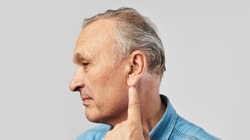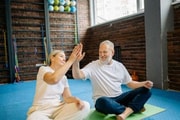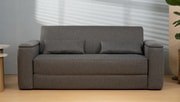Drink coffee and still sleep like a baby? Discover how to avoid those nasty jitters with expert tips now!
By
KenAlunan
- Replies 10
For many Aussies a morning cup of coffee is as essential as the sunrise.
It's a cherished ritual, a moment of calm before the day's activities, and a necessary jolt to kickstart the system for some.
However, the love affair with coffee isn't without its complications. Some of us find that caffeine can lead to sleepless nights, a racing heart, or a case of jitters that feel more like jitterbug than gentle buzz.
But fear not, coffee aficionados! There are ways to enjoy your beloved brew without the unwelcome side effects.
Let's explore how you can sip your espresso and enjoy a peaceful slumber.
Understanding Caffeine Sensitivity: It's in Your Genes
The key to understanding why coffee affects people differently lies in our DNA.
The rate at which our bodies metabolise caffeine can vary greatly, which is largely determined by our genetics.
The CYP1A2 gene is particularly influential in this process. Some people have a version of this gene that allows them to process caffeine quickly, while others have a variant that slows the process down significantly.
This genetic diversity means that while one person might feel energised after a cup, another might be left with lingering effects for hours, disrupting sleep and causing discomfort.
Flick Lucas, a sports nutrition expert at Oxford Brookes, said, ‘Many people can break down coffee really fast, meaning they get that instant energy boost.’
‘But some don’t get that advantage and the caffeine can stay in the body for up to nine hours, triggering unwelcome symptoms. It’s only really in the past few years that we’ve begun to understand just how big a role genetics plays in this effect.’
Listening to your body and recognising how you react to caffeine is essential.
The Type of Coffee Matters
Not all coffees are created equal when it comes to caffeine content. The two main types of coffee beans, arabica and robusta, have different levels of caffeine.
Arabica beans, typically used in higher-end coffees and most coffee shops, have less caffeine than the more robust robusta beans.
If you're sensitive to caffeine, opting for a coffee made with arabica beans might be a better choice.
Moreover, how your coffee is prepared can also affect its caffeine content.
For instance, cold brew coffee, which involves steeping coffee grounds in cold water for an extended period, tends to have a higher caffeine concentration.
On the other hand, filter coffee, which has less contact time between the water and coffee grounds, usually contains less caffeine.
Kurt Stewart, founder of Volcano Coffee Works in South London, said that in general, ‘The more contact time there is between the coffee and the water, the more caffeinated the drink is going to be…So American-style filter coffee [where hot water is passed through the ground beans and a paper filter] is never going to be very caffeinated, which is why you can drink it all day.’
Hydration and Exercise: Natural Remedies for Caffeine Side Effects
If you feel over-caffeinated, there are natural ways to mitigate the effects.
Experts maintain that staying well-hydrated is crucial, as coffee has diuretic properties that can lead to dehydration, exacerbating symptoms like anxiety and palpitations.
Drinking a glass of water for every cup of coffee can help balance this out.
Additionally, research suggests that engaging in brisk exercise can help alleviate the side effects of too much caffeine.
Physical activity can speed up your metabolism, helping your body to process and eliminate caffeine more quickly. A quick walk or cycle can do wonders if you're feeling jittery.
Supplements and Decaf: Alternatives and Placebos
Some people swear by supplements like L-theanine, an amino acid found in tea, to counteract the jittery effects of caffeine. While the scientific evidence is inconclusive, many find it helps smooth out the rough edges of a caffeine high.
And let's not forget about decaffeinated coffee. For many, decaf provides the ritual and taste of coffee without the sleep-disrupting effects. Plus, with the rise in popularity of half-caffeinated coffee blends, you can tailor your intake to suit your sensitivity.
For many, decaf provides the ritual and taste of coffee without the sleep-disrupting effects. Plus, with the rise in popularity of half-caffeinated coffee blends, you can tailor your intake to suit your sensitivity.
Dr Duane Mellor, a dietitian at Aston University, said, ‘Decaffeinated coffee still contains the beneficial ingredients.’
He then added, ‘It’s possible it could still give you an energy boost too. For many people, having a coffee is more about the habit than the caffeine, it’s a taste they link with starting the day. And you still get that bitter taste with decaf.’
Remember, Coffee Can Be Good for You
It's worth noting that coffee isn't just about caffeine. It's packed with polyphenols and even contains fibre, both of which have health benefits.
Moderate coffee consumption has been linked to a reduced risk of various diseases, including heart disease. So, enjoying your coffee in a way that suits your body can be part of a healthy lifestyle.
In conclusion, while coffee is a beloved part of many of our daily routines, it's important to be mindful of how it affects us individually.
By understanding our caffeine sensitivity, choosing the right type of coffee, staying hydrated, exercising, and considering supplements or decaf options, we can continue to enjoy our coffee without sacrificing our sleep or comfort.

Feeling empowered by these tips on how to enjoy your coffee without the jittery side effects? Try out this recipe for Iced Coffee Mocha by our member @Suzanne rose!
How do you enjoy your coffee, members? Have you found a particular blend or preparation method that works for you? Share your experiences in the comments below!
It's a cherished ritual, a moment of calm before the day's activities, and a necessary jolt to kickstart the system for some.
However, the love affair with coffee isn't without its complications. Some of us find that caffeine can lead to sleepless nights, a racing heart, or a case of jitters that feel more like jitterbug than gentle buzz.
But fear not, coffee aficionados! There are ways to enjoy your beloved brew without the unwelcome side effects.
Let's explore how you can sip your espresso and enjoy a peaceful slumber.
Understanding Caffeine Sensitivity: It's in Your Genes
The key to understanding why coffee affects people differently lies in our DNA.
The rate at which our bodies metabolise caffeine can vary greatly, which is largely determined by our genetics.
The CYP1A2 gene is particularly influential in this process. Some people have a version of this gene that allows them to process caffeine quickly, while others have a variant that slows the process down significantly.
This genetic diversity means that while one person might feel energised after a cup, another might be left with lingering effects for hours, disrupting sleep and causing discomfort.
Flick Lucas, a sports nutrition expert at Oxford Brookes, said, ‘Many people can break down coffee really fast, meaning they get that instant energy boost.’
‘But some don’t get that advantage and the caffeine can stay in the body for up to nine hours, triggering unwelcome symptoms. It’s only really in the past few years that we’ve begun to understand just how big a role genetics plays in this effect.’
Listening to your body and recognising how you react to caffeine is essential.
The Type of Coffee Matters
Not all coffees are created equal when it comes to caffeine content. The two main types of coffee beans, arabica and robusta, have different levels of caffeine.
Arabica beans, typically used in higher-end coffees and most coffee shops, have less caffeine than the more robust robusta beans.
If you're sensitive to caffeine, opting for a coffee made with arabica beans might be a better choice.
Moreover, how your coffee is prepared can also affect its caffeine content.
For instance, cold brew coffee, which involves steeping coffee grounds in cold water for an extended period, tends to have a higher caffeine concentration.
On the other hand, filter coffee, which has less contact time between the water and coffee grounds, usually contains less caffeine.
Kurt Stewart, founder of Volcano Coffee Works in South London, said that in general, ‘The more contact time there is between the coffee and the water, the more caffeinated the drink is going to be…So American-style filter coffee [where hot water is passed through the ground beans and a paper filter] is never going to be very caffeinated, which is why you can drink it all day.’
Hydration and Exercise: Natural Remedies for Caffeine Side Effects
If you feel over-caffeinated, there are natural ways to mitigate the effects.
Experts maintain that staying well-hydrated is crucial, as coffee has diuretic properties that can lead to dehydration, exacerbating symptoms like anxiety and palpitations.
Drinking a glass of water for every cup of coffee can help balance this out.
Additionally, research suggests that engaging in brisk exercise can help alleviate the side effects of too much caffeine.
Physical activity can speed up your metabolism, helping your body to process and eliminate caffeine more quickly. A quick walk or cycle can do wonders if you're feeling jittery.
Supplements and Decaf: Alternatives and Placebos
Some people swear by supplements like L-theanine, an amino acid found in tea, to counteract the jittery effects of caffeine. While the scientific evidence is inconclusive, many find it helps smooth out the rough edges of a caffeine high.
And let's not forget about decaffeinated coffee. For many, decaf provides the ritual and taste of coffee without the sleep-disrupting effects. Plus, with the rise in popularity of half-caffeinated coffee blends, you can tailor your intake to suit your sensitivity.
For many, decaf provides the ritual and taste of coffee without the sleep-disrupting effects. Plus, with the rise in popularity of half-caffeinated coffee blends, you can tailor your intake to suit your sensitivity.
Dr Duane Mellor, a dietitian at Aston University, said, ‘Decaffeinated coffee still contains the beneficial ingredients.’
He then added, ‘It’s possible it could still give you an energy boost too. For many people, having a coffee is more about the habit than the caffeine, it’s a taste they link with starting the day. And you still get that bitter taste with decaf.’
Remember, Coffee Can Be Good for You
It's worth noting that coffee isn't just about caffeine. It's packed with polyphenols and even contains fibre, both of which have health benefits.
Moderate coffee consumption has been linked to a reduced risk of various diseases, including heart disease. So, enjoying your coffee in a way that suits your body can be part of a healthy lifestyle.
In conclusion, while coffee is a beloved part of many of our daily routines, it's important to be mindful of how it affects us individually.
By understanding our caffeine sensitivity, choosing the right type of coffee, staying hydrated, exercising, and considering supplements or decaf options, we can continue to enjoy our coffee without sacrificing our sleep or comfort.
Key Takeaways
- Sensitivity to coffee and its effects such as anxiety or sleeplessness can be attributed to genetics, with a specific gene, CYP1A2, affecting how fast caffeine is metabolised.
- The type of coffee bean, preparation method, and individual consumption habits can impact the severity of coffee's side effects, like jitteriness and heart palpitations.
- Adequate hydration, exercise, and potentially the amino acid supplement L-theanine may help mitigate unwanted side effects of caffeine consumption.
- Decaffeinated coffee still provides health benefits such as polyphenols and fibre, and may offer a psychological energy boost without the intense effects of caffeine.
How do you enjoy your coffee, members? Have you found a particular blend or preparation method that works for you? Share your experiences in the comments below!
Last edited:










